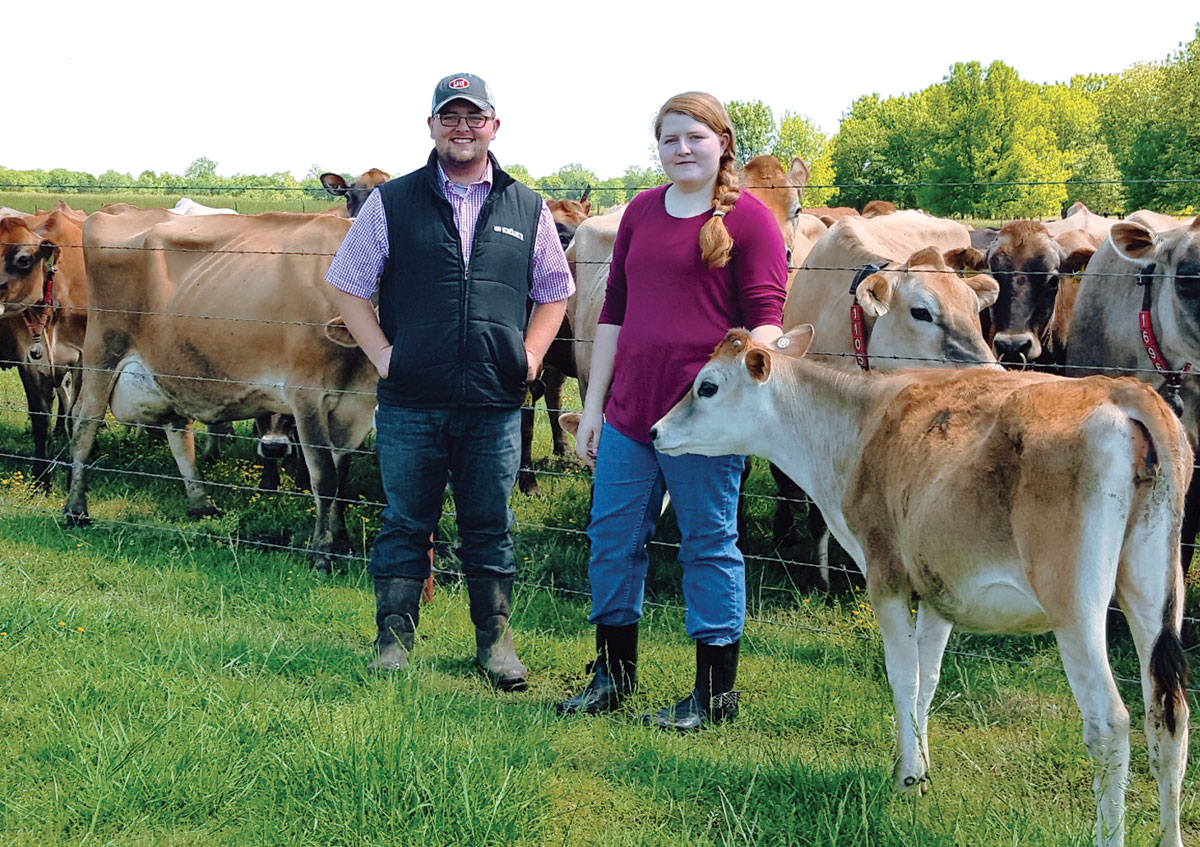
Earl and Othenia (Hughes) Burkes operate a 364-acre farm 11 miles south of Huntsville, Ark., on War Eagle Creek, most of which has been in Othenia’s family for 165 years. They live on and also operate another 340-acre farm just north of Huntsville, Ark. The Arkansas Agricultural Department presented a Century Farm plaque certifying continuous family ownership of the south farm back to 1845.
Othenia’s great-grandfather’s will, as recorded in the original abstract of title, contained many interesting bequeaths such as “a mower and hay rake to JB Hughes” and to Everett Tassey “one horse, my watch and chain, and all the books in my personal library at the time of my death, as well as forgiveness of any debts owed to me at that time.”
Othenia was a widowed mother of four young children when she asked her sister, Naomi, to drive her into Huntsville to pick up some aspirin for one of her children with a cold. On that hurried trip into town, Othenia met Earl Burkes, the man that would become her future husband.
The couple eventually married and had three additional children they began to raise on their farm north of Huntsville.
“The place was pretty much a jungle when we bought it in 1963. I always had an off the farm job which meant that weekends and holidays were packed with farm work,” Earl said.
“The kids and I always did as much as possible on the farm while Earl worked days at Coca-Cola through the week,” Othenia added.
In addition to Earl’s job, the family relied on income from beef cattle and later broiler production to ensure survival of the farm.
The couple built four broiler houses in the late 1970s when comprehensive facility use capitalized on combination broiler/Cornish hen production with half of the chicks in each house sold as Cornish so the rest had room to continue growing to broiler size. The chicken litter from the broilers provided a boost to cattle operations by providing a nitrogen rich fertilizer for the grazing land.
The couple sold the broiler operation in 1998 when the construction of the north loop of US Highway 412 around Huntsville dissected the farm.
In regard to the cattle operation, Earl said he got a little help from an old friend.
“Early on I got some of the best advice I have ever received from an old Huntsville cattleman named Buck Vaughn who told me the secret to being successful in the beef cattle business was to buy production cattle when the market looked the worst and to reduce or thin your herd when the market looked the best,” Earl recalled. “I have always tried to follow that advice with good result.”
The couple have tried various breeds in their cattle operation before finding what they liked.
“Like many older farmers, we got into the exotic cattle breed fad by trying Salers, Santa Gertrudis and others before settling on Charolais and Black Angus crosses for vigor and because of their size and adaptability to Arkansas rugged terrain and fluctuating climate,” Earl said.
Remnants of this “rainbow herd” still remain though the majority is now Charolais/Black Angus.
When downsizing, momma cows are culled according to temperament, calf production, size and color rather than just age. Bulls run with the herd year round, and calves are weaned and sold at regular intervals. The herd is grass fed and supplemented with vitamins, minerals (usually a magnesium salt combination) as well as range cubes and grass hay in the winter season.
A hobby that evolved into a revenue stream for the farm was Earl’s knack for buying and selling mules.
He frequently purchased quality mules across Arkansas, Oklahoma and Tennessee, then transported them to the northwest Rockies for sale to the US Forest Service and area trail guides for use as pack and riding animals.
Before long, Earl had a good reputation of supplying sturdy, good natured mules for use in the rugged wilderness areas of Montana, Idaho and Washington. The venture resulted in the transfer of more than 200 mules for this purpose.
More recently, the family operates a red dirt mining operation near Huntsville. The north farm, now directly in the growth path for the newly annexed portion of Huntsville along the US 412 corridor, will eventually succumb to the commercial and residential development that is encompassing the area. The south farm, however, has been placed into a family trust for its preservation and continuance.
With this kind of adaptability and innovation, one can see how the family has been able to maintain the ownership and operation of a heritage farm for so many years.
“It has never been easy, but with sheer determination, strength in family, good neighbors, and some luck, we are fortunate to be able to pass this farming legacy to the next generation,” Earl said.







